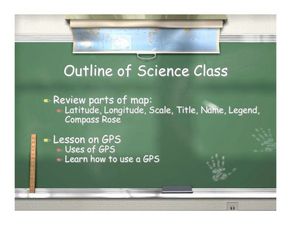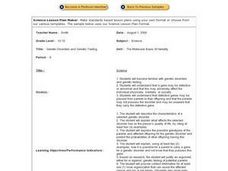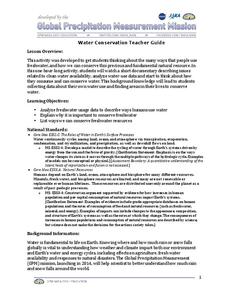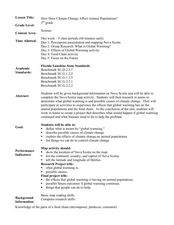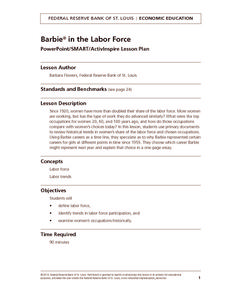ARKive
Adaptations to Arid Habitats
How do plants and animals survive in habitats with very little water? Explore arid ecosystems and the way their inhabitants have adapted with a lesson and science experiment. After kids listen to a presentation about adaptation, they...
Teach Engineering
Bone Density Math and Logarithm Introduction
What do logarithms have to do with bone density? Scholars learn that the equation for bone density includes logarithms. The majority of the third instructional activity of seven is devoted to logarithms and their properties.
Curated OER
The Global Precipitation Measurement Mission (GPM) Lesson
Introduce your class to one of the ways that technology is benefiting humanity. The Global Precipitation Measurement Mission involves the data collected by nine satellites from different countries with a united focus on studying world...
Curated OER
Peek at the Chesapeake!
Students research organisms that live in the Chesapeake Bay ecosystem. In this science lesson, students choose an organism and research how it is affected by humans. Students create a presentation of their findings.
NOAA
Stressed Out!
Are our oceans really suffering due to the choices humans make? The sixth and final installment in the volume of activities challenges research groups to tackle one of six major topics that impact ocean health. After getting to the...
ARKive
Biodiversity and Evolution – Darwin’s Finches
Teens experience natural selection firsthand (or first beak) in an activity that has them act as finches foraging for food. Using different household items to act as different beak styles, your little finches will collect as much...
Curated OER
Lesson on GPS
Students investigate global positioning systems. For this technology and mapping lesson, students view a PowerPoint presentation in which they identify the features of a GPS, state its uses, and follow steps to find a waypoint.
Carnegie Mellon University
Hydroelectricity
Use a simple PowerPoint presentation to introduce you environmental studies class to hydropower. Hold a debate about the pros and cons of developing this form of alternative energy. Power up your class with this simple lesson on a topic...
NOAA
Invertebrates
Crabs and lobsters ... yum! The 18th installment of a 23-part NOAA Enrichment in Marine sciences and Oceanography (NEMO) program focuses on invertebrate marine life. After the lecture slideshow, learners conduct an activity to sample...
Curated OER
Genetic Disorder and Genetic Testing
Sixth graders explore the characteristics of a selected genetic disorder and research relevant information to justify an argument either for or against genetic testing. Your class can work in groups to gather specific information in...
Curated OER
Water Conservation
Open learners' eyes to the challenge of finding safe drinking water – something we often take for granted in our country. The PowerPoint presentation includes images, graphs, diagrams, and even a video to stimulate discussion on how we...
Discovery Education
Jets in Flight
This Discovery Education activity provides the information needed to understand the basics of flight. Before taking off, young pilots learn the eight stages of the engineering design process. Small groups then design and build...
NOAA
Tracking a Drifter
Be shore to use this drifter resource. The third installment of a five-part series has learners using the NOAA's Adopt-a-Drifter website to track to movement of a drifter (buoy) in the ocean. Graphing the collected data on a map allows...
Polar Trec
Nature's Density Column
Nature provides density columns in the polar regions that provides food for many animals. Young scientists build their own density columns with water in order to answer analysis questions. Through a slideshow presentation, scholars...
Purdue University
Exploring Whirligigs
What's that silly thing spinning in the wind? It's a whirligig! Explore wonderful windy whirligigs with a STEM-based unit that teaches the science and concepts behind these gigs. Scholars discover how gravity and air resistance...
Beyond Benign
Orb-It
How do the products you use rate on a greeness scale? Scholars use a tool to analyze shampoos and cars for their sustainability. They consider factors that affect the environment, the economy, and equity. This is the ninth lesson in...
University of Wisconsin
Getting the Word Out
An appropriate way to celebrate and conclude the construction of a rain garden is to share it with the community. Small groups collaborate to design an outreach product such as a PowerPoint presentation, brochure, or poster, to draw...
Curated OER
Lesson 14: Genetic Disorders
Students create PowerPoint presentation on the topic they researched. In this biology lesson, students fill out a storyboard about their topic. They share their project in class.
Curated OER
A Powerpoint Presentation On Sustainability
Students are introduced to the important geography concept of sustainability by looking at the Roseau River floods of 2002. They discuss the impact of humans on the environment. They explain how sustainability relates to everyday geography.
Curated OER
How Does Climate Change Affect Animal Populations?
Young scholars investigate the effect of climate change on animal population in Nova Scotia. In this environmental science lesson, students complete a Nova Scotia map activity and research the causes of global warming in small groups....
PHET
Planetary Magnetism
What do magnetic fields look like? The best way to learn about magnetic fields is to try identifying them for yourself. Scholars will understand the importance of magnetic fields after completing this experiment. The extension activities...
Federal Reserve Bank
Barbie in the Labor Force
How have the women's share of the labor force and chosen occupations evolved in the United States over the last century? Using census reports, graphs detailing the gender makeup of the labor force, and analysis of the careers of...
Curated OER
The Three Rock Groups
Firts graders distinguish between sedimentary, igneous, and metamorphic rocks. They group the rocks into the appropriate group. This is one of the best-organized plans I've seen! Learners watch a PowerPoint presentation which is embedded...






